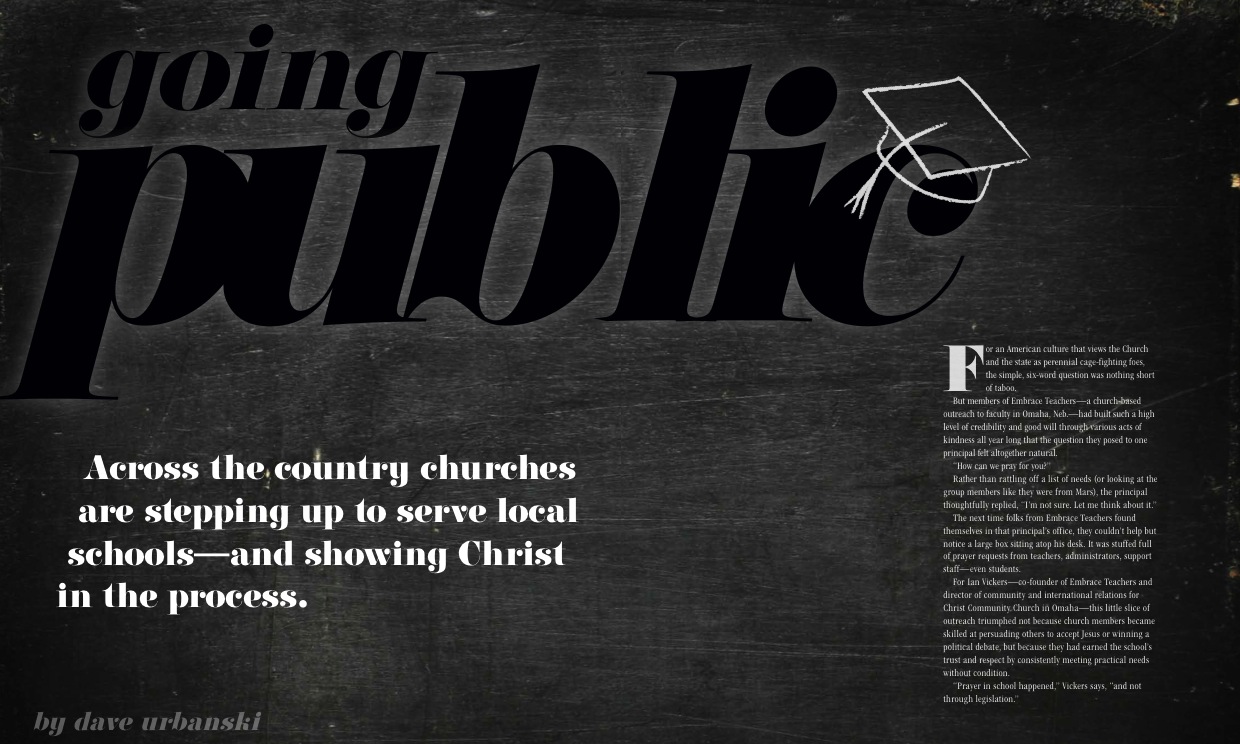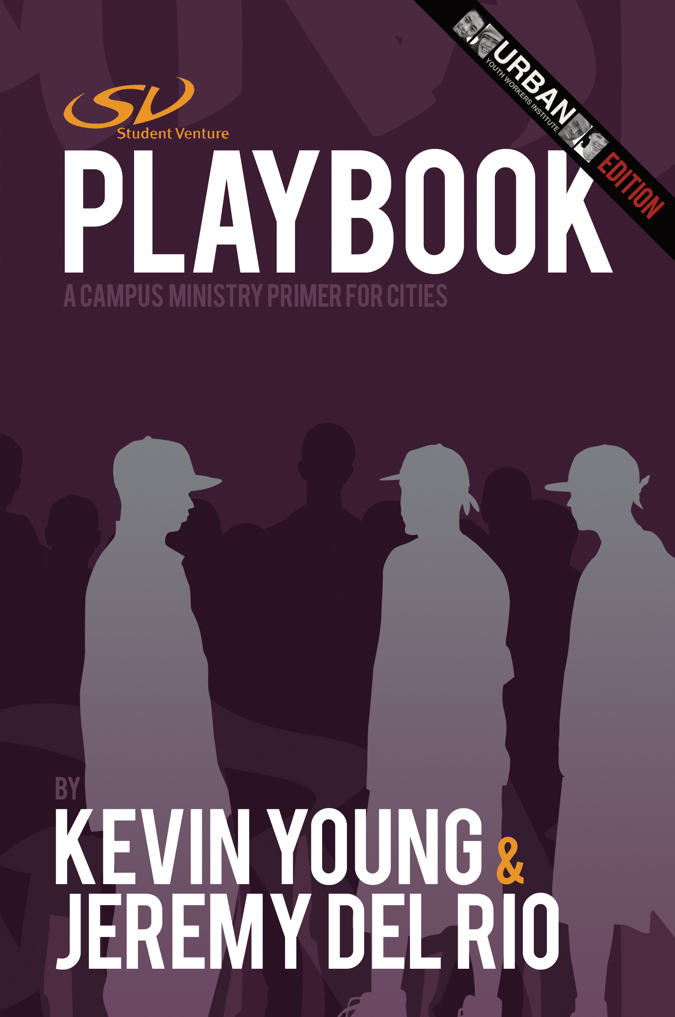Going Public
[Ed. Note: The comment below was published as a Sidebar to a feature article called "Going Public" (by Dave Urbanski) in the Sept/Oct 2009 issue of
Outreach magazine. Download the article
pdf here.]
 In September 2008, Jeremy Del Rio launched 20/20 Vision for Schools in New York City with one idea in mind: What would happen if church leaders activated the people in their churches for “good deeds†within public schools?
Since then, the ministry has connected with nearly 200 churches throughout NYC boroughs, mobilizing them and community groups to come alongside public schools for meaningful advocacy and service.
Here, Del Rio shares how 20/20 Vision has succeeded and why he believes churches are called to this backyard mission field.
In September 2008, Jeremy Del Rio launched 20/20 Vision for Schools in New York City with one idea in mind: What would happen if church leaders activated the people in their churches for “good deeds†within public schools?
Since then, the ministry has connected with nearly 200 churches throughout NYC boroughs, mobilizing them and community groups to come alongside public schools for meaningful advocacy and service.
Here, Del Rio shares how 20/20 Vision has succeeded and why he believes churches are called to this backyard mission field.
If the moral test of a society is how it treats children, America has failed the same test year after year for decades. Specifically, we have failed to educate the urban poor despite promising equal access to quality education for all. This educational inequity--where the place of one’s childhood determines the quality of one’s education--has been called our nation’s greatest injustice and the Civil Rights issue of our day.
And churches have watched it happen.
As we looked at what it would take to accomplish comprehensive reform, we knew it would require multi-sector, collaborative strategies led by men and women willing to commit. And churches are uniquely positioned to lead this effort.
First, the God we preach requires us to care about justice (Micah 6:8, Isaiah 61:1-8). The prologue to Proverbs 31’s Wife of Noble Character describes the Bride of Christ at her most noble: “Speak up for those who cannot speak for themselves, for the rights of all who are destitute. Speak up and judge fairly; defend the rights of the poor and needy†(Proverbs 31:8-9).
Second, Jesus activates us as salt and light, that the world “may see your good deeds and praise your Father in heaven†(Matthew 5:13-16). Salt that loses its preservative and flavoring effects–or remains inside the saltshaker of our churches--is useless.
20/20 Vision is bent on activating churches. Our vision is that first graders of September 2008—the graduating high school class of 2020—would reverse decades of chronic underperformance and graduate in record numbers, equitably across demographics and neighborhoods, with the skills and character necessary to achieve in life.
Mobilizing congregations for scalable engagement requires a plan, and 20/20’s school adoption paradigm moves congregations from no relationship to holistic, transformative relationships. It begins by committing to pray for a specific neighborhood school as often as the church prays. If America’s 300,000 evangelical churches actually prayed for its 100,000 public schools, dare we expect God to answer?
It continues as congregations overcome generational mistrust by cultivating personal relationships at the school. Next, churches become answers to prayer by responding to felt needs with meaningful acts of service such as beautification efforts or event sponsorships. Then they develop an ongoing presence by volunteering as coaches, mentors or tutors, or coordinating leadership clubs. Finally comes the credibility to affect policy both at the school and district level.
To date, nearly 200 New York churches have adopted schools through 20/20. Together, these churches have open-sourced a multi-sector effort to transform education in America. Because the problems are too vast for one person, group or community to overcome on its own, sharing ideas, best practices, funding solutions, evaluation methodologies and reform strategies represents the best way to engage the best minds in transforming public education in this country.
If it’s “about the kids,†20/20 reminds us to share.
And to lead.
--Jeremy Del Rio
ONLINE:
JeremyDelRio.com;
2020Schools.net
Rev. Jeremy Del Rio, Esq. is the lead architect of 20/20 Vision for Schools.
 In September 2008, Jeremy Del Rio launched 20/20 Vision for Schools in New York City with one idea in mind: What would happen if church leaders activated the people in their churches for “good deeds†within public schools?
Since then, the ministry has connected with nearly 200 churches throughout NYC boroughs, mobilizing them and community groups to come alongside public schools for meaningful advocacy and service.
Here, Del Rio shares how 20/20 Vision has succeeded and why he believes churches are called to this backyard mission field.
If the moral test of a society is how it treats children, America has failed the same test year after year for decades. Specifically, we have failed to educate the urban poor despite promising equal access to quality education for all. This educational inequity--where the place of one’s childhood determines the quality of one’s education--has been called our nation’s greatest injustice and the Civil Rights issue of our day.
And churches have watched it happen.
As we looked at what it would take to accomplish comprehensive reform, we knew it would require multi-sector, collaborative strategies led by men and women willing to commit. And churches are uniquely positioned to lead this effort.
First, the God we preach requires us to care about justice (Micah 6:8, Isaiah 61:1-8). The prologue to Proverbs 31’s Wife of Noble Character describes the Bride of Christ at her most noble: “Speak up for those who cannot speak for themselves, for the rights of all who are destitute. Speak up and judge fairly; defend the rights of the poor and needy†(Proverbs 31:8-9).
Second, Jesus activates us as salt and light, that the world “may see your good deeds and praise your Father in heaven†(Matthew 5:13-16). Salt that loses its preservative and flavoring effects–or remains inside the saltshaker of our churches--is useless.
20/20 Vision is bent on activating churches. Our vision is that first graders of September 2008—the graduating high school class of 2020—would reverse decades of chronic underperformance and graduate in record numbers, equitably across demographics and neighborhoods, with the skills and character necessary to achieve in life.
Mobilizing congregations for scalable engagement requires a plan, and 20/20’s school adoption paradigm moves congregations from no relationship to holistic, transformative relationships. It begins by committing to pray for a specific neighborhood school as often as the church prays. If America’s 300,000 evangelical churches actually prayed for its 100,000 public schools, dare we expect God to answer?
It continues as congregations overcome generational mistrust by cultivating personal relationships at the school. Next, churches become answers to prayer by responding to felt needs with meaningful acts of service such as beautification efforts or event sponsorships. Then they develop an ongoing presence by volunteering as coaches, mentors or tutors, or coordinating leadership clubs. Finally comes the credibility to affect policy both at the school and district level.
To date, nearly 200 New York churches have adopted schools through 20/20. Together, these churches have open-sourced a multi-sector effort to transform education in America. Because the problems are too vast for one person, group or community to overcome on its own, sharing ideas, best practices, funding solutions, evaluation methodologies and reform strategies represents the best way to engage the best minds in transforming public education in this country.
If it’s “about the kids,†20/20 reminds us to share.
And to lead.
--Jeremy Del Rio
ONLINE: JeremyDelRio.com; 2020Schools.net
Rev. Jeremy Del Rio, Esq. is the lead architect of 20/20 Vision for Schools.
In September 2008, Jeremy Del Rio launched 20/20 Vision for Schools in New York City with one idea in mind: What would happen if church leaders activated the people in their churches for “good deeds†within public schools?
Since then, the ministry has connected with nearly 200 churches throughout NYC boroughs, mobilizing them and community groups to come alongside public schools for meaningful advocacy and service.
Here, Del Rio shares how 20/20 Vision has succeeded and why he believes churches are called to this backyard mission field.
If the moral test of a society is how it treats children, America has failed the same test year after year for decades. Specifically, we have failed to educate the urban poor despite promising equal access to quality education for all. This educational inequity--where the place of one’s childhood determines the quality of one’s education--has been called our nation’s greatest injustice and the Civil Rights issue of our day.
And churches have watched it happen.
As we looked at what it would take to accomplish comprehensive reform, we knew it would require multi-sector, collaborative strategies led by men and women willing to commit. And churches are uniquely positioned to lead this effort.
First, the God we preach requires us to care about justice (Micah 6:8, Isaiah 61:1-8). The prologue to Proverbs 31’s Wife of Noble Character describes the Bride of Christ at her most noble: “Speak up for those who cannot speak for themselves, for the rights of all who are destitute. Speak up and judge fairly; defend the rights of the poor and needy†(Proverbs 31:8-9).
Second, Jesus activates us as salt and light, that the world “may see your good deeds and praise your Father in heaven†(Matthew 5:13-16). Salt that loses its preservative and flavoring effects–or remains inside the saltshaker of our churches--is useless.
20/20 Vision is bent on activating churches. Our vision is that first graders of September 2008—the graduating high school class of 2020—would reverse decades of chronic underperformance and graduate in record numbers, equitably across demographics and neighborhoods, with the skills and character necessary to achieve in life.
Mobilizing congregations for scalable engagement requires a plan, and 20/20’s school adoption paradigm moves congregations from no relationship to holistic, transformative relationships. It begins by committing to pray for a specific neighborhood school as often as the church prays. If America’s 300,000 evangelical churches actually prayed for its 100,000 public schools, dare we expect God to answer?
It continues as congregations overcome generational mistrust by cultivating personal relationships at the school. Next, churches become answers to prayer by responding to felt needs with meaningful acts of service such as beautification efforts or event sponsorships. Then they develop an ongoing presence by volunteering as coaches, mentors or tutors, or coordinating leadership clubs. Finally comes the credibility to affect policy both at the school and district level.
To date, nearly 200 New York churches have adopted schools through 20/20. Together, these churches have open-sourced a multi-sector effort to transform education in America. Because the problems are too vast for one person, group or community to overcome on its own, sharing ideas, best practices, funding solutions, evaluation methodologies and reform strategies represents the best way to engage the best minds in transforming public education in this country.
If it’s “about the kids,†20/20 reminds us to share.
And to lead.
--Jeremy Del Rio
ONLINE: JeremyDelRio.com; 2020Schools.net
Rev. Jeremy Del Rio, Esq. is the lead architect of 20/20 Vision for Schools.

 Welcome to the professional website and personal weblog of Jeremy Del Rio. Whether you're a client, friend, or curious onlooker, please don't stay a spectator. Engage the conversation. Your contributions matter here.
Welcome to the professional website and personal weblog of Jeremy Del Rio. Whether you're a client, friend, or curious onlooker, please don't stay a spectator. Engage the conversation. Your contributions matter here.

















